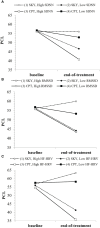Emotion regulation and heart rate variability may identify the optimal posttraumatic stress disorder treatment: analyses from a randomized controlled trial
- PMID: 38389985
- PMCID: PMC10881770
- DOI: 10.3389/fpsyt.2024.1331569
Emotion regulation and heart rate variability may identify the optimal posttraumatic stress disorder treatment: analyses from a randomized controlled trial
Abstract
Introduction: High variability in response and retention rates for posttraumatic stress disorder (PTSD) treatment highlights the need to identify "personalized" or "precision" medicine factors that can inform optimal intervention selection before an individual commences treatment. In secondary analyses from a non-inferiority randomized controlled trial, behavioral and physiological emotion regulation were examined as non-specific predictors (that identify which individuals are more likely to respond to treatment, regardless of treatment type) and treatment moderators (that identify which treatment works best for whom) of PTSD outcome.
Methods: There were 85 US Veterans with clinically significant PTSD symptoms randomized to 6 weeks of either cognitive processing therapy (CPT; n = 44) or a breathing-based yoga practice (Sudarshan kriya yoga; SKY; n = 41). Baseline self-reported emotion regulation (Difficulties in Emotion Regulation Scale) and heart rate variability (HRV) were assessed prior to treatment, and self-reported PTSD symptoms were assessed at baseline, end-of-treatment, 1-month follow-up, and 1-year follow-up.
Results: Greater baseline deficit in self-reported emotional awareness (similar to alexithymia) predicted better overall PTSD improvement in both the short- and long-term, following either CPT or SKY. High self-reported levels of emotional response non-acceptance were associated with better PTSD treatment response with CPT than with SKY. However, all significant HRV indices were stronger moderators than all self-reported emotion regulation scales, both in the short- and long-term. Veterans with lower baseline HRV had better PTSD treatment response with SKY, whereas Veterans with higher or average-to-high baseline HRV had better PTSD treatment response with CPT.
Conclusions: To our knowledge, this is the first study to examine both self-reported emotion regulation and HRV, within the same study, as both non-specific predictors and moderators of PTSD treatment outcome. Veterans with poorer autonomic regulation prior to treatment had better PTSD outcome with a yoga-based intervention, whereas those with better autonomic regulation did better with a trauma-focused psychological therapy. Findings show potential for the use of HRV in clinical practice to personalize PTSD treatment.
Clinical trial registration: ClinicalTrials.gov identifier, NCT02366403.
Keywords: cognitive processing therapy; emotion regulation; heart rate variability; moderator; posttraumatic stress disorder; precision medicine; predictor; yoga.
Copyright © 2024 Mathersul, Zeitzer, Schulz-Heik, Avery and Bayley.
Conflict of interest statement
The authors declare that the research was conducted in the absence of any commercial or financial relationships that could be construed as a potential conflict of interest. The author(s) declared that they were an editorial board member of Frontiers, at the time of submission. This had no impact on the peer review process and the final decision.
Figures



Similar articles
-
Emotion dysregulation and heart rate variability improve in US veterans undergoing treatment for posttraumatic stress disorder: Secondary exploratory analyses from a randomised controlled trial.BMC Psychiatry. 2022 Apr 15;22(1):268. doi: 10.1186/s12888-022-03886-3. BMC Psychiatry. 2022. PMID: 35428258 Free PMC article. Clinical Trial.
-
Study protocol for a non-inferiority randomised controlled trial of SKY breathing meditation versus cognitive processing therapy for PTSD among veterans.BMJ Open. 2019 Apr 3;9(4):e027150. doi: 10.1136/bmjopen-2018-027150. BMJ Open. 2019. PMID: 30948610 Free PMC article.
-
Randomised clinical non-inferiority trial of breathing-based meditation and cognitive processing therapy for symptoms of post-traumatic stress disorder in military veterans.BMJ Open. 2022 Aug 25;12(8):e056609. doi: 10.1136/bmjopen-2021-056609. BMJ Open. 2022. PMID: 36008059 Free PMC article. Clinical Trial.
-
Autonomic dysfunction in posttraumatic stress disorder indexed by heart rate variability: a meta-analysis.Psychol Med. 2020 Sep;50(12):1937-1948. doi: 10.1017/S003329172000207X. Epub 2020 Aug 28. Psychol Med. 2020. PMID: 32854795 Free PMC article. Review.
-
Psychotherapy for Military-Related PTSD: A Review of Randomized Clinical Trials.JAMA. 2015 Aug 4;314(5):489-500. doi: 10.1001/jama.2015.8370. JAMA. 2015. PMID: 26241600 Review.
References
-
- APA . Diagnostic and statistical manual of mental disorders. 5th ed. Washington, DC: American Psychiatric Publishing; (2013).
-
- NICE. NationalClinicalPracticeGuideline . Post-traumatic stress disorder: The management of PTSD in adults and children in primary and secondary care Vol. 26. Leicester, UK: Gaskell Royal College of Psychiatrists and The British Psychological Society; (2005). - PubMed
-
- ISTSS . Effective treatments for PTSD: Practice guidelines from the International Society for Traumatic Stress Studies. 2nd ed. Foa EB, Keane TM, Friedman MJ, Cohen JA, editors. New York, NY: Guilford Press; (2008).
-
- Benedek DM, Friedman MJ, Zatzick D, Ursano RJ. Guideline watch (March 2009): Practice guideline for the treatment of patients with acute stress disorder and posttraumatic stress disorder. Focus (2009) 7(2):204–13. doi: 10.1176/foc.7.2.foc204 - DOI
Associated data
LinkOut - more resources
Full Text Sources
Medical

